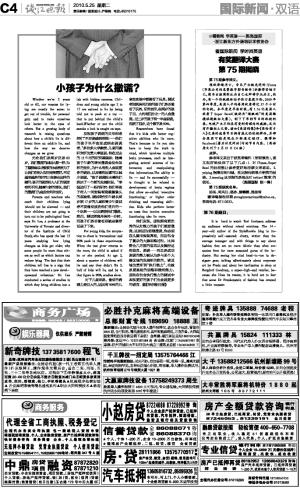小孩子为什么撒谎?
Whether we're 2 years old or 62, our reasons for lying are mostly the same: to get out of trouble, for personal gain and to make ourselves look better in the eyes of others. But a growing body of research is raising questions about how a child's lie is different from an adult's lie, and how the way we deceive changes as we grow.
无论我们是两岁还是62岁,我们撒谎的原因大都一样:为了摆脱麻烦、得到好处或者是为了让我们在别人眼里变得更好。不过越来越多的研究正在提出这样的疑问:孩子的谎言和大人们的谎言有何不同;随着年龄的增长,我们的撒谎行为会发生何种变化。
Parents and teachers who catch their children lying 'should not be alarmed -- and their children are not going to turn out to be pathological liars,' says Dr. Lee, a professor at the University of Toronto and director of the Institute of Child Study,who has spent the last 15 years studying how lying changes as kids get older, why some people lie more than others as well as which factors can reduce lying. 'The fact that their children tell lies is a sign that they have reached a new developmental milestone.' Dr. Lee conducted a series of studies in which they bring children into a lab with hidden cameras. Children and young adults age 2 to 17 are enticed to lie by being told not to peek at a toy -- that is put behind the child's back.Whether or not the child sneaks a look is caught on tape.
发现孩子说谎的父母和老师们“不应该感到恐慌──他们的孩子也不会变成病态说谎者,”多伦多大学教授、儿童问题研究所负责人李强说。他在过去的15年里的研究课题是:随着孩子年龄的增长撒谎会发生怎样的变化,为什么有些人会说更多的谎话,以及哪些因素可以减少说谎。“孩子说谎标志着他们到达了一个新的发展阶段。”李强进行了一系列研究:他们将孩子带入一间安装有隐蔽摄像头的实验室。测试者告知年龄从两岁到17岁的儿童和青少年受试者不要偷看放在他们背后的一个玩具──以此诱使他们撒谎。然后,测试者离开房间一分钟,而孩子们是否偷看则被录像带记录了下来。
For young kids, the temptation to cheat is 'tremendous' and 90% peek in these experiments. When the test giver returns to the room, the child is asked if he or she peeked. At age 2, about a quarter of children will lie and say they didn't. By 3, half of kids will lie, and by 4, that figure is 90%, studies show.
对于儿童来说,偷看的诱惑力是巨大的,因此有90%的儿童在实验中都偷看了玩具。测试者回到房间后询问孩子们是否偷看了玩具。研究显示,在两岁的孩子里,大约有四分之一的人会撒谎。过三岁的孩子有一半会说谎,而到了四岁,这个数字是90%。
Researchers have found that it's kids with better cognitive abilities who lie more. That's because to lie you also have to keep the truth in mind, which involves multiple brain processes, such as integrating several sources of information and manipulating that informationa.The ability to lie -- and lie successfully -- is thought to be related to development of brain regions that allow so-called 'executive functioning,' or higher order thinking and reasoning abilities. Kids who perform better on tests that involve executive functioning also lie more.
他们发现,那些拥有更优秀的认知能力的孩子们更爱撒谎。这是因为要想撒谎,你必须在头脑里保留真相,而这包含了复杂的大脑思维过程,比如整合几方面的信息以及操控这些信息。说谎──而且是成功说谎的能力被认为是与某个大脑区域的发展相关联的,该区域负责所谓“执行能力”,也就是更高级的思维和推理能力。那些在包含执行能力的测试中表现更好的孩子们也会说更多的谎言. 据《华尔街日报》
